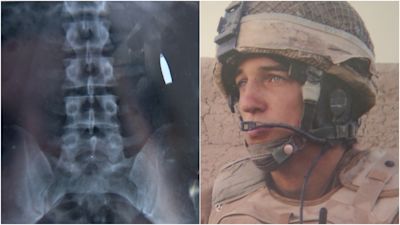Afghanistan: 'Miracle' soldier who 'died six times' but still walks with bullet lodged next to spine

In 2006, the soldiers of C Company, 3rd Battalion the Parachute Regiment, posed for a photo at their base in Sangin in Afghanistan's Helmand Province. At that time, Sangin was the most dangerous place on earth, the centre of British forces' fight against the Taliban. The Paras were sent to Helmand Province after the 2001 invasion of Afghanistan, a response to the September 11 terror attacks in the United States. The campaign lasted 20 years and cost the lives of 457 British soldiers. ITV News has tried to trace the people on the C Company photograph 15 years on to tell their stories, in our series Afghanistan: Photo From The Frontline.
By ITV News Senior Correspondent Paul Davies
By rights, John Dippnall shouldn’t be with us today. There are no outward signs to tell you this likeable father-of-three is a walking medical miracle, though you would probably find out if you were standing near him in an airport security queue and the alarms started to sound.
Within his body, John carries a souvenir of his days with the Parachute Regiment serving in Helmand Province.
It’s a fully intact bullet aimed at him by a Taliban fighter with the intention of ending his life - and it so nearly succeeded.
The round is embedded close to his spine, so close surgeons decided that attempting to remove it was too dangerous, so John has spent two decades carrying this reminder of his time in Afghanistan everywhere he goes.
'I was incredibly lucky and incredibly unlucky at the same time'
“I’ve learned to live with it,” he told me, showing the small scar where the bullet entered his side.
“I can feel it, but there is no pain, it’s just a nuisance when we go on holiday and it sets the security machines off.”
John is softly spoken and matter-of-fact as he describes two tours of Afghanistan, seeing friends and comrades killed and injured but never believing it could happen to him until it did.
He is able to describe in great detail what it feels like to be shot, likening it to being struck in the chest with a baseball bat but with no pain.
'I pulled my hand away and it was just red everywhere': John initially thought the bullet missed him, then he saw the blood
It is only when he talks about what happened next and the people who risked their own lives to save his that he becomes emotional and you can see that small piece of metal isn’t the only thing he’s been carrying with him every day since.
It was standard practice in those days when allied forces were suffering heavy casualties for Chinook helicopters to fly in to extract wounded soldiers and get them to expert medical care as quickly as possible.
That hadn’t been an option on the day John was hit, the firefight was so fierce an incoming helicopter would almost certainly have been shot down by the Taliban.
It was left to John Dippnall’s Para mates to keep him alive, working on him in a ditch under fire while another group of comrades launched a desperate rescue bid in ground vehicles.
“They volunteered to get me and didn’t bother sweeping the area for IEDs (booby trap explosives), just drove straight in,” he said.
'They had to open me up on the helicopter': John says he died six times on the helicopter
John’s story came close to ending a short time later when it was possible for a helicopter to fly him to the main military hospital at Camp Bastion.
“I crashed on the journey” is the way he describes the multiple occasions his heart stopped beating.
“Six times I died and six times they brought me back”.
John Dippnall was unable to continue his military career. He lost part of a lung, his spleen and a kidney.
Today he is happily settled into a new life as an electrical engineer and father of two sons and a daughter, but he admits Afghanistan and all that happened there is often on his mind.
It can happen when he is driving and he will pull off the road until the emotions have passed.
One day, when the security situation allows, he would like to return but more than anything else he would like an opportunity to thank the people who disregarded their own safety to give him the life he has today.
Read more stories from our series Afghanistan: Photo From The Frontline